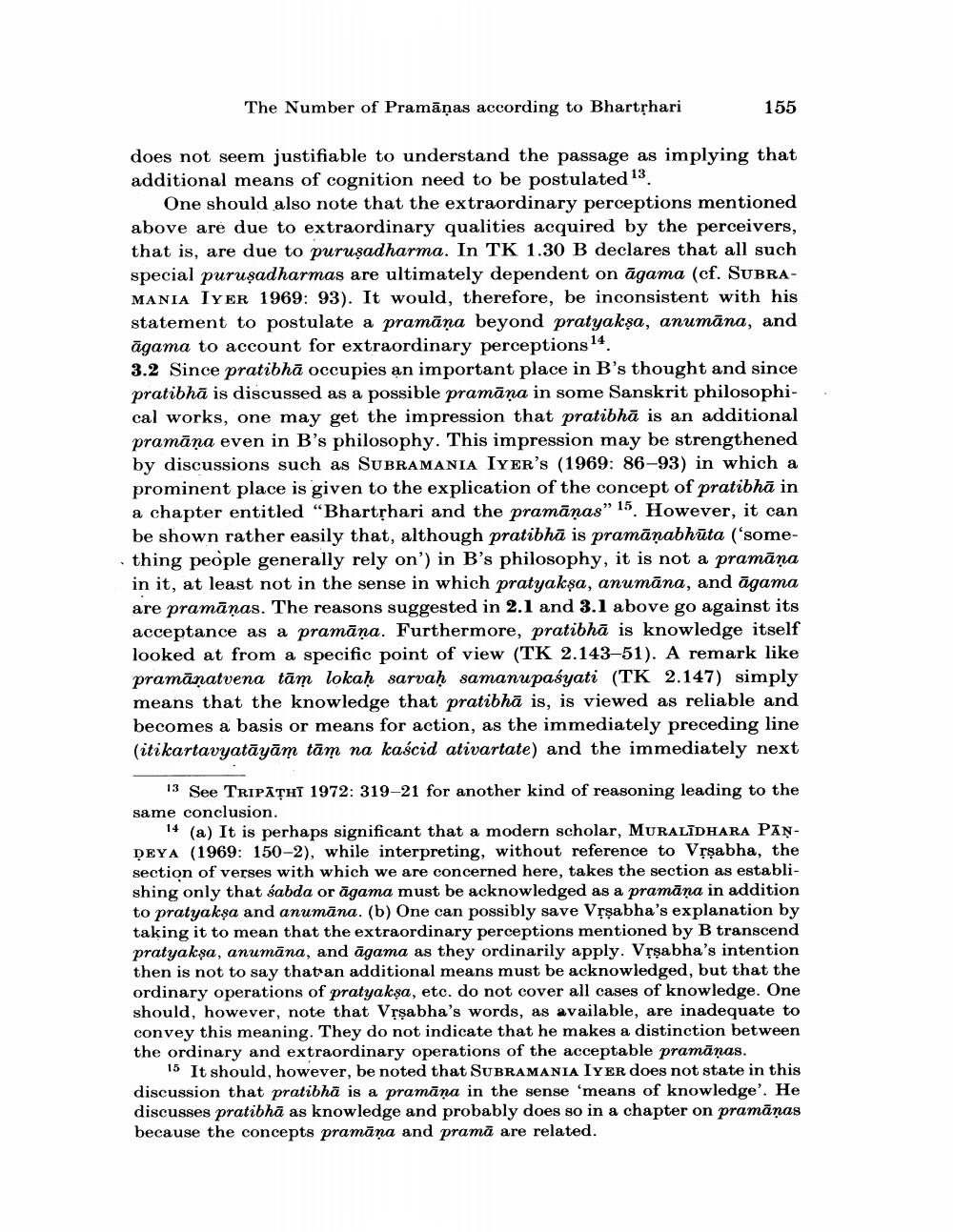Book Title: Number Of Pramanas According To Bhartrhari Author(s): Ashok Aklujkar Publisher: Ashok Aklujkar View full book textPage 5
________________ The Number of Pramāņas according to Bhartṛhari 155 does not seem justifiable to understand the passage as implying that additional means of cognition need to be postulated 13. One should also note that the extraordinary perceptions mentioned above are due to extraordinary qualities acquired by the perceivers, that is, are due to purusadharma. In TK 1.30 B declares that all such special purusadharmas are ultimately dependent on agama (cf. SUBRAMANIA IYER 1969: 93). It would, therefore, be inconsistent with his statement to postulate a pramāna beyond pratyakṣa, anumāna, and agama to account for extraordinary perceptions 14. 3.2 Since pratibha occupies an important place in B's thought and since pratibha is discussed as a possible pramāņa in some Sanskrit philosophical works, one may get the impression that pratibha is an additional pramana even in B's philosophy. This impression may be strengthened by discussions such as SUBRAMANIA IYER'S (1969: 86-93) in which a prominent place is given to the explication of the concept of pratibhā in a chapter entitled "Bhartṛhari and the pramāņas" 15. However, it can be shown rather easily that, although pratibha is pramāṇabhūta ('something people generally rely on') in B's philosophy, it is not a pramāņa in it, at least not in the sense in which pratyakṣa, anumāna, and agama are pramānas. The reasons suggested in 2.1 and 3.1 above go against its acceptance as a pramana. Furthermore, pratibha is knowledge itself looked at from a specific point of view (TK 2.143-51). A remark like. pramāṇatvena tām lokaḥ sarvaḥ samanupaiyati (TK 2.147) simply means that the knowledge that pratibha is, is viewed as reliable and becomes a basis or means for action, as the immediately preceding line (itikartavyatäyäm tam na kaścid ativartate) and the immediately next. 13 See TRIPATHI 1972: 319-21 for another kind of reasoning leading to the same conclusion. 14 (a) It is perhaps significant that a modern scholar, MURALĪDHARA PANDEYA (1969: 150-2), while interpreting, without reference to Vṛṣabha, the section of verses with which we are concerned here, takes the section as establishing only that sabda or agama must be acknowledged as a pramāņa in addition to pratyakṣa and anumana. (b) One can possibly save Vṛṣabha's explanation by taking it to mean that the extraordinary perceptions mentioned by B transcend pratyakşa, anumāna, and agama as they ordinarily apply. Vṛṣabha's intention then is not to say that an additional means must be acknowledged, but that the ordinary operations of pratyakṣa, etc. do not cover all cases of knowledge. One should, however, note that Vrṣabha's words, as available, are inadequate to convey this meaning. They do not indicate that he makes a distinction between the ordinary and extraordinary operations of the acceptable pramāņas. 15 It should, however, be noted that SUBRAMANIA IYER does not state in this discussion that pratibha is a pramāņa in the sense 'means of knowledge'. He discusses pratibha as knowledge and probably does so in a chapter on pramāņas because the concepts pramāna and prama are related.Page Navigation
1 ... 3 4 5 6 7 8
